Le
Jour se Lève (Daybreak)
1939
Director: Marcel Carné
Starring: Jean “Studmuffin” Gabin,
Jacqueline Laurent, Arletty, Jules Berry
Film
noir, as a genre, is most definitely considered an American creation. French film critics of the 1950s and 1960s
noticed that certain American films from the forties and fifties had developed
a distinct tone, look, and shared thematic elements, and they coined the phrase
“film noir” to describe it. In spite of
the French name, though, they were talking about American films, and most will
agree that film noir really started in the early forties. But I really start to question all of that –
that noir is an American cinematic invention, that it started in the early
1940s – when I watch Le Jour se Lève. I suppose it doesn’t fall as neat and tidily
into the film noir category as other classic noirs, but it’s so damn
close. It must have been influential in
helping develop the genre.
The
film opens as François (Gabin) shoots a man (Berry) in his apartment building,
then barricades himself in his room, refusing to open up to the police. He flashes back to how he wound up in such a
situation, starting with meeting pretty Françoise (Laurent), with whom he fell
deeply in love. But Françoise is not as
innocent as she looks, and soon we learn of her history with Monsieur Valentin,
a dog trainer, circus performer, general con man, and, coincidentally, the man
that François shoots. In between spats
of jealousy over Françoise and the lies that Valentin feeds him, François also
meets Clara (Arletty), Valentin’s assistant, who knows all Valentin’s tricks
and isn’t nearly the picture of innocence that Françoise is. His life with these two very different women
who share him and the dastardly Valentin in common flashes before him and leads
him up to the night of the shooting.
Although
Le
Jour se Lève is definitely dark, even nihilistic, Carné is smart and
doesn’t take us there right away. He
lets the doom and gloom build slowly, and when we see François’ first
flashback, he’s positively beaming with happiness. To me, this is where the film hooks me. I buy François and Françoise so implicitly as
a couple, and I so adore their early scene of pretend homemaking together, that
I become emotionally invested in both their fates. This scene is so important in the film as it
points out with humor but also pathos just how desperately François longs for
normality in his life. Growing up an
orphan, he feels a connection to Françoise because she was also raised in an
orphanage. As the two of them potter
around her landlord’s house at night while the landlord is out, they play act a
fantasy where it is THEIR house, THEIR ironing, THEIR children who left the toys
out. This dream of mundane domesticity
is everything to François, and he speaks sincerely of marriage and a future
with Françoise, and I’m just putty in his hands. I’m all in.
I want everything for François. I
have bought into the central relationship and the central character of the
film, and everything that happens afterward will be that much sadder because of
it.
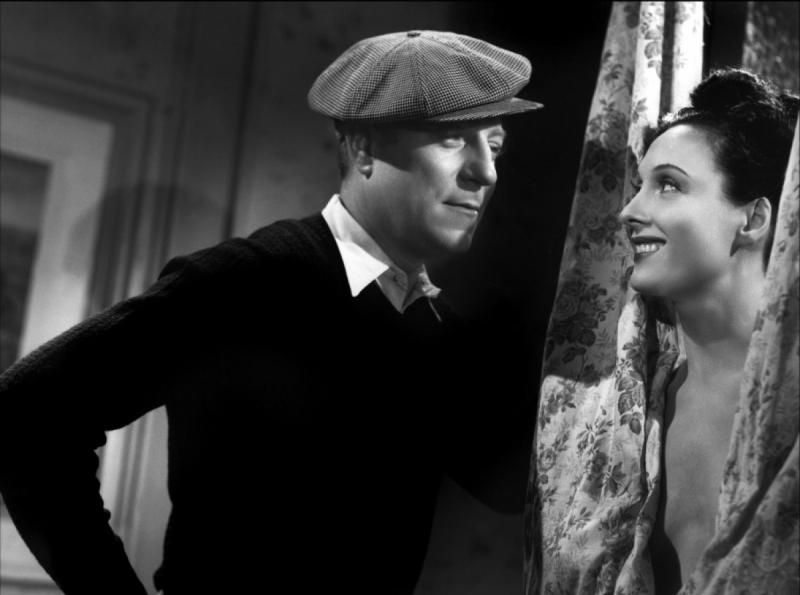 |
| Um, yes please. |
Clara
and Françoise are an interesting pair of women to involve François with, as
they are so much opposites. At first
glance, Françoise is the girl you take home to your parents, all innocence and
sweetness and light, and Clara is the girl you ring up for a booty call because
you know she’ll oblige. What I like
about Le Jour se Lève is how it subverts these expectations. Françoise is not nearly as innocent as she
looks (a revelation that eats away at François as he contemplates the fact that
his darling Françoise is still in love with her shady ex), and Clara has hidden
emotional depth. Every time François
thinks he has everything sorted out, every time he thinks he has a handle on
one or perhaps both of these women, something new comes to light and once again
he realizes he is wrong. I like these
women. They are more than caricatures. As the film hurtles towards its gloomy
finale, these two opposites are even revealed to have so much more in common
than we ever could have thought. Rather
than resigning them to broad strokes, they have depth.
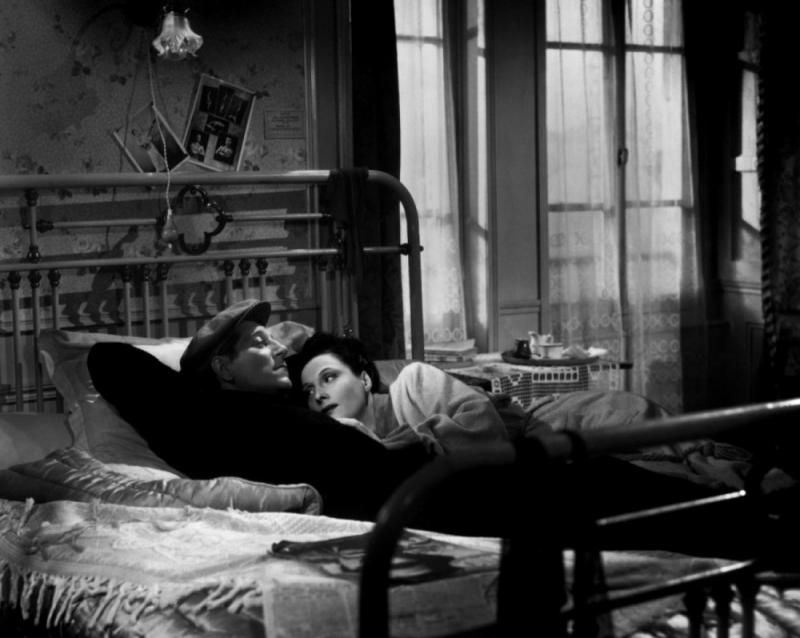 |
| You have no idea how much I want to be Arletty in this scene. |
Shall
I go on my typical “Jean Gabin = sex god” rant?
Sure, why not, it’s my review.
Jesus Christ, but Gabin is MY KIND OF MOVIE STAR. The male actors I find most attractive
definitely share certain traits, and Gabin has them in spades. First of all, he can act. If an actor is ridiculously awful, no amount
of good looks will sway a damn thing for me.
He’s excellent in Le Jour se Lève at detailing
François’ increasing desperation as he falls deeper in love yet is stymied too
many times by Valentin and his awful hold over Françoise and Clara. Gabin has to take François from very cheery
guy to someone who, whether he meant to or not, shot a man at point blank
range, and he has the range to do it.
Not only is he good at showing François’ emotional journey, but he also
has the task of bringing François through the standoff with the cops, a
harrowing process indeed. When you add
on to all of this the sort of rugged, everyman quality I *really* like in an
actor, I’m hooked. I don’t like my
Hollywood hunks to be prettier than me.
I like some rugged, dirty sex appeal, something less dressed up and more
organic. Let’s put it this way – Marlon
Brando in A Streetcar Named Desire makes my ovaries explode, while
Orlando Bloom does absolutely nothing for me.
Gabin has that same sort of Brando-esque appeal. I can’t help it – I’m crushing on him
hardcore. He acts, he broods, he swoons,
he goes crazy, and (shoutout to Movie Guy Steve) his hair is fantastic. And yes, I'm using this review to shamelessly post sexy pictures of him.
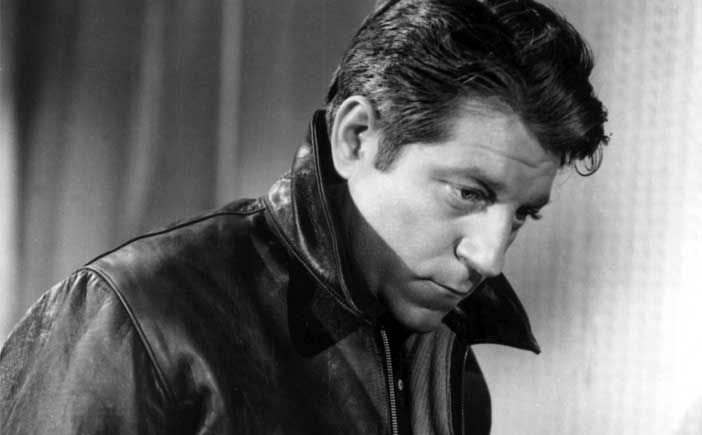 |
| Jesus effing Christ, slice me off a piece of that. |
When
you take all these elements and add on the noir-in-training of the film, how
could this not be a hit with me? It
really shouldn’t be a secret that this film ends badly; when it opens with
François shooting someone, you can just sense it’s all going to cascade
downhill at some point. I love the
plodding of the soundtrack, moving, unrelentingly, toward the film’s conclusion. There are drumbeats, like a funeral dirge, punctuating
the soundtrack frequently, as François knows only too well what waits for
him. Carné’s photography transitions
from brighter lights in the first half of the film to the significant darkness
of the second half as the desperation ratchets up to the brink of no return.
I
wonder, a bit, at this film being made in France in 1939 with WWII breaking out
in Europe. The sense of fatalism, of
moving toward a foregone conclusion, of being unable or unwilling to fight any
longer, is this what some people in France felt? It must have colored the filmmaking; how
could it not? I believe wholeheartedly
that those American filmmakers who would go on to create the iconic noir of the
next decade must have taken a heavy cue from Le Jour se Lève.
Arbitrary
Rating: 9/10. And one additional note:
when I first started watching films from 1001 Movies, this one was
unavailable anywhere. I am very pleased
to see that in the years since, it has been given the Criterion treatment
(“Essential Art House”) as it deserves to be preserved and seen. Also, I smell a Jean Gabin movie marathon in
my future.
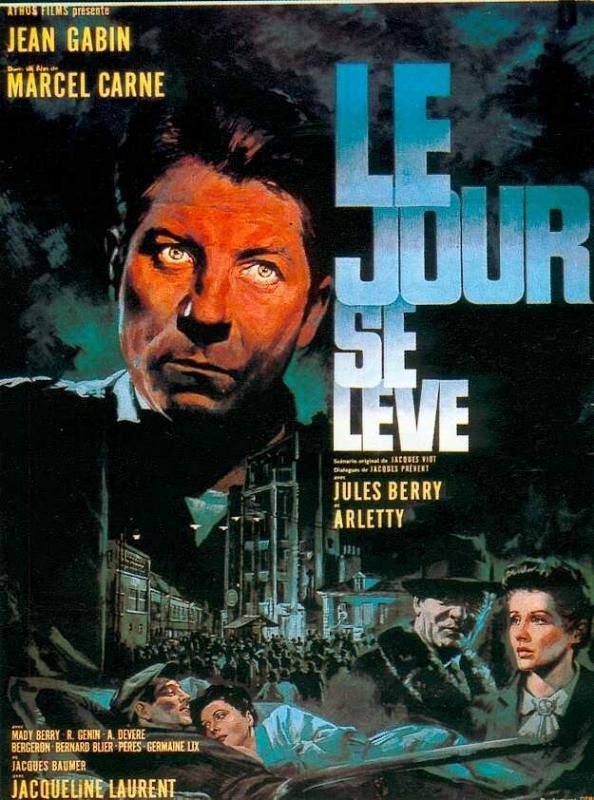
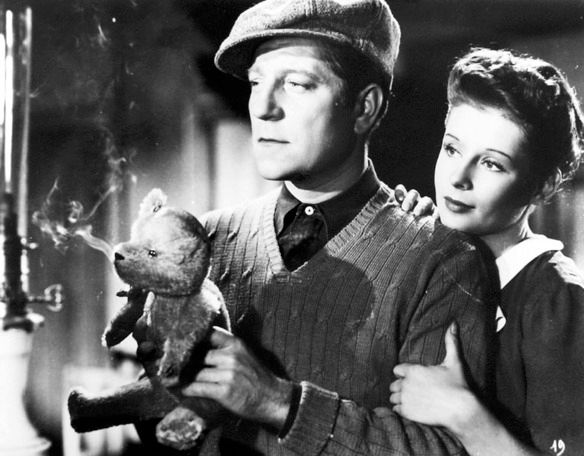
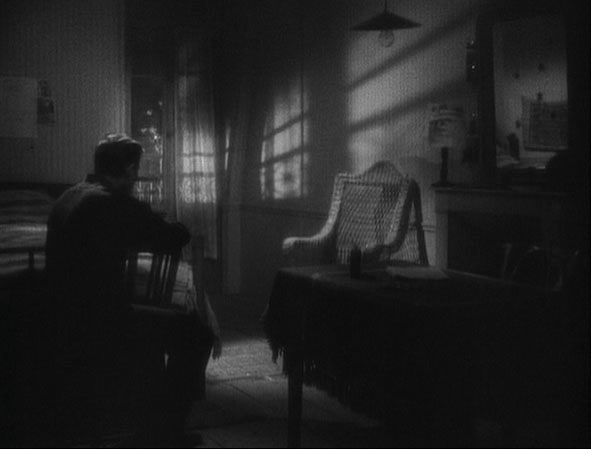
For me, this one was all about possession--the two men will do anything to possess the women in their lives. Hardly progressive, but certainly compelling. It's pre-noir, and certainly has plenty of noir in it.
ReplyDeleteAnd I love the leather jacket, too. I didn't think people looked that cool pre-1950s.
Your Jean Gabin marathon should probably include Le Plasir and La Bete Humaine, two Gabin films that have gotten the Criterion treatment but didn't get listed. And I'll see your Jean Gabin marathon and raise you an all-day Barbara Stanwyck film festival.
Possession is a definite theme to this film, and one I didn't think of so much. I guess I read this as Francois' desperation for normality (with Francoise or Clara) slowly driving him crazy - like he's finally figured a way out of his situation, and it requires a woman - but Valentin keeps on mucking things up for him. But having said that, possession is certainly a part of his desire to be "normal," because he's decided he can't be "normal" on his own, he NEEDS one of those two women.
DeleteJean Gabiiiiiiiiiiiiiiiiiiiiiiiiiiiin. I'm still fanning myself.
Thanks for the recommendation for other Gabin work. I will definitely be making a point to see those.
Yah, I know you have a thing for Stanwyck. Nice taste - she's just... she's AWESOME. I respect the hell out of her, and she makes anything and everything watchable.
Thank you for the eye candy! Swooooon!!! He's still sexy later in life. Try Renoir's French Can Can or Becker's Touchez pas au Grisbi, both from 1954.
ReplyDeleteThanks for the recommendations! I'll definitely check them out!
DeleteIt's nice to know I'm not the only one swooning over the awesome sauce that is Jean Gabin. :D
Given that this film is about 70% Jean Gabin I should have guessed you would love this one. I am totally in on all the film noir stuff. In a sense it is prototype noir and very interesting cinematography. The story however I was not so hooked on. The different parts did not add up for me and I did not connect with Francois. It seems to me he got himself into a lot of unnecessary trouble. Maybe I should see it again.
ReplyDeleteFair enough. After all, I'd be lying if I said my love for Gabin biased me towards liking this film, and definitely towards sympathizing with Francois.
Deleteyeezy shoes
ReplyDeletesupreme clothing
supreme t shirt
hermes belt
michael kors handbags outlet
michael kors outlet
off white x jordan 1
yeezys
supreme clothing
jordan shoes